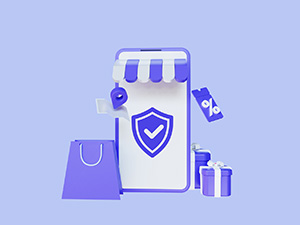
Are you planning on buying gifts online for the special women in your life for Mother’s Day? Shopping online is a great place to find the best deals, compare prices, and get gifts shipped straight to your door, however it is important to do it SAFELY. During the holidays, cybercriminals ramp up various scams to capitalize on innocent people looking for gifts online. These scams range from fake offers to sham giveaways, all with the goal of stealing your money and information. Times and technology have changed drastically in just the last year, meaning what kept you safe before is no longer enough. In today’s blog, we’ll share the best way to pay for your online purchases, the common scams to look out for, and the top online shopping best practices to keep you safe.
How To Make Online Purchases Safely
Should you use your debit card to buy online? No! Debit cards are linked directly to your bank account. If you make a bad purchase online, it can be very difficult to get your money back once you’ve alerted your bank. To avoid headaches, hours on the phone arguing with customer support, losing money and, if things escalate enough, legal fees, use your credit card or a third-party payment system (such as PayPal) instead.
Credit cards have extensive fraud monitoring systems, which can often catch discrepancies as they occur. These companies use statistical analysis and machine learning to track and analyze your transactions to quickly identify suspicious activity, allowing you to dispute the purchases and avoid being charged.
Some credit card companies, like Capital One, go a step further to keep you secure by offering virtual credit cards. These cards provide you with a random 16-digit number, a three-digit CVV and an expiration date that you can use for online or even in-store purchases. While these DO connect to your real accounts, retailers are unable to see your actual card details, keeping your information secure. Bonus: These can be “turned off” at any time, eliminating the hassle of canceling unneeded subscriptions without going through the merchant.
Third-party tools like PayPal are also a great option because no personal information is exchanged with the seller. The company you’re purchasing from does not receive your financial or banking information, keeping your data secure.
Online Shopping Best Practices
Using a credit card, virtual card or third-party payment tool is a great start, but it isn’t the only proactive step you should be taking to stay safe online. If you’re making purchases online, make sure you’re also:
- Only Shop on Popular or Familiar Websites
Search results can lead you to scammer websites or even infect your device with malware. A good deal just isn't worth the risk when we all know Amazon carries everything under the sun. Likewise, almost every major retail outlet, from Target to Best Buy to Home Depot, has an online store.Beware of misspellings or sites using a different top-level domain (.net instead of .com, for example)—those are the oldest tricks in the book. Yes, sales on these sites might look enticing, but that's how they trick you into giving up your info.
- Look for the Lock
If you're unsure if the site you're buying from is legit, look at your browser's address bar. Never buy anything online from a site that doesn't display a lock icon near the URL. The lock icon means your data transfers are more secure than they on an unencrypted site.Another way to tell if a site is secure is to look for a URL that starts with https://, which is standard, even on non-shopping sites. Google Chrome even flags any page without the extra S as "not secure."
- Research the Seller Before Buying
If you're wary of a site, perform your due diligence. The Better Business Bureau has an online directory and a scam tracker. Yelp and Google are packed with retailer reviews. Put companies through the wringer before you plunk down your credit card number.
That said—online reviews can be gamed. If you see nothing but positive feedback and can't tell if the writers are legitimate customers, follow your instincts.
If nothing else, make sure you've got a concrete address and a working phone number for the seller. If things go bad, you have a place to take your complaint. In fact, call them before you order so you can clarify a return policy and where to go with any issues after the purchase.
- Lie or Omit Personal Information on Shopping Forms
There is no reason why an online shopping website needs to know your birthday, middle name, Social Security number, or any other personal information beyond your payment method and mailing address. Feel free to lie if a retailer requires you to fill in that kind of data to complete your transaction. What are they going to do? Tell on you?
The more scammers know about you, the easier it is to steal your identity. When possible, default to giving up as little personal data as possible.
- Set Up Alerts for Your Bank Account
Regularly review the electronic statements for your credit card, debit card, and checking accounts. If you see something wrong, pick up the phone to address the matter quickly. Set up alerts - Go into your banking system and enable notifications. You can request to be notified when any purchases or purchases over a certain amount are made, so you can quickly report any suspicious activity. In the case of credit cards, pay the bill only when you know all your charges are accurate. You have 30 days to notify the bank or card issuer of problems; however, you might be liable for the charges anyway.
- Pay With Your Phone in Stores
Paying for items using your smartphone has become standard in brick-and-mortar stores and is more secure than using your credit card. Using a mobile payment app like Apple Pay or Google Pay means you've authenticated your identity using your device, so no one else can claim to be you and steal your data or money. Plus, you're avoiding card skimmers.
- Watch Out for Fraudulent Gift Card Sales
When it comes to gift cards, stick to the source when you buy one; scammers like to auction off gift cards on sites like eBay with little or no funds on them. There are many gift card "exchanges" out there that are a great idea—letting you trade away cards you don't want for the cards that you do—but you can't trust everyone else using such a service. You might get a card and find it's already been used. Make sure the site you're using has a rock-solid guarantee policy. Better yet, go directly to a retail brick-and-mortar store to get the physical card.
- Stay Private While Using Public Wi-Fi
If you're shopping via a public hotspot, stick to known networks, even if they're free, like those found at Starbucks or Barnes & Noble. You should probably also use a virtual private network (VPN) to be safe.
- Install and Use Security Apps
Use a password manager to create uncrackable passwords and passkeys.
It's also a good idea to protect against malware with regular updates to your antivirus program. Better yet, pay for a full-blown security suite, which will have antivirus software and will also fight spam, spear-phishing emails, and phishing attacks from websites (the latter two try and steal your info by mimicking a message or site that looks legit).
Remember, it's not enough to have this stuff installed. Make sure your anti-malware tools are always up to date. Otherwise, any new threats can get to your devices—and there are always new threats.
- If You Do Get Scammed, Don't Get Mad, Get Revenge
Don't be embarrassed if you get taken for a ride while online shopping. Instead, make a bit of scene—online, of course. Complain to the seller. If you don't get satisfaction, report the incident to the Federal Trade Commission (FTC), your state's attorney general, or even the FBI. That's probably going to work best if you buy in the US, rather than with foreign sites. If you're going to get scammed, try to get scammed locally...or at least domestically.
Cybercriminals will use any method they can to steal your information and money.
To stay safe, you must take a proactive approach to protecting your financial information. This is equally true for your business. If hackers are willing to put this much effort into stealing money for low-dollar purchases, imagine what they would do to access your company accounts. Your customer data, employee information, trade secrets and more can be worth millions to them.
If you’re not sure if your company is as secure as it should be or you just want to get a second set of eyes on your system to make sure there aren’t any holes in your security, we’ll perform a FREE Network Security Assessment for you. We’ll go through our multi-step security checklist and let you know if and where cybercriminals can get into your network.
Click here to book your FREE Network Security Assessment now or call our office at 502-842-4607.





